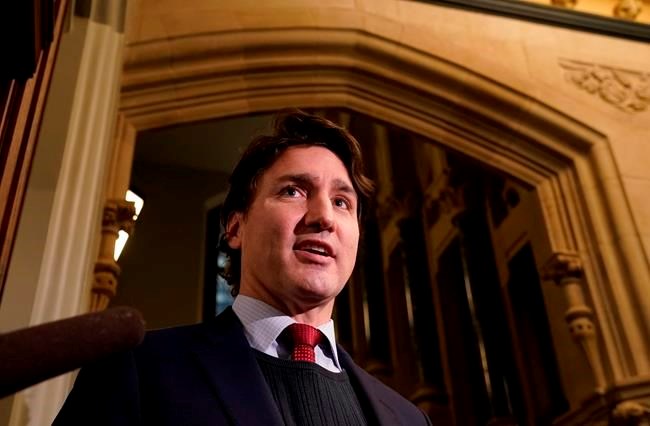OTTAWA — Prime Minister Justin Trudeau says Canada will join a diplomatic boycott of the Winter Olympics in Beijing next year, citing extensive human rights abuses by the Communist regime in the host country.
The decision comes two days after the United States announced it would not send government officials to the Olympics over concerns about China's human rights record, and particularly allegations of genocide against the Muslim Uyghur minority in the Xinjiang province.
Australia, New Zealand and the United Kingdom have all since followed suit.
Trudeau said Canada too is "extremely concerned by the repeated human rights violations by the Chinese government."
"I don't think the decision by Canada or by many other countries to choose to not send a diplomatic representation to the Beijing Olympics and Paralympics is going to come as a surprise to China," he said Wednesday.
"We have been very clear over the past many years of our deep concerns around human rights violations and this is a continuation of us expressing our deep concerns for human rights violations."
A diplomatic boycott means Canadian athletes can and will still compete but no government officials will attend, including Pascale St-Onge, the new minister of sport.
While it has been rare in recent years for the prime minister to attend an Olympics, Canada normally sends multiple government representatives including cabinet ministers and often the governor general.
Last summer, Employment Minister Carla Qualtrough represented the Canadian government at the delayed Tokyo Olympics. In 2018 in Pyeongchang, Trudeau requested then-governor general Julie Payette attend for Canada. Kirsty Duncan, then the sport minister, attended both the Olympics and Paralympics along with several staff members.
Former governor general David Johnston attended for Canada at the 2016 Summer Olympics in Rio de Janeiro and at the 2012 Summer Games in London.
There were some calls for countries to stage a boycott of the 2008 Summer Olympics in Beijing over human rights concerns, or at least to refuse to attend the opening ceremonies. But former prime minister Stephen Harper rejected that idea and sent his foreign affairs minister, David Emerson, to attend the games, including the opening ceremonies.
China denies allegations of human rights abuses and is accusing the United States of upending the political neutrality of sport. Chinese diplomats slammed the decisions by the U.S. and Australia, accusing countries of using the Olympics as a pawn, and adding several times that "nobody cares" whether diplomats attend the Games.
Mac Ross, a kinesiology professor at Western University's International Centre for Olympic Studies, said Canada is sending a message to China and the International Olympic Committee that it "will not support the hosting of Olympic Games against the backdrop of widespread human rights violations.”
Ross also said China's accusation that the boycotts politicize the Olympics ignores how many times China itself boycotted the Games.
“The People’s Republic of China has staged full boycotts of the Olympics multiple times, on purely political grounds," Ross said. "Why are boycotts suddenly unacceptable? The answer is simple: they place the regime’s human rights record front and centre.”
In a written statement, Canadian Olympic Committee CEO David Shoemaker and Canadian Paralympic Committee CEO Karen O'Neill said they respect the decision made by the government.
“The Canadian Olympic Committee and Canadian Paralympic Committee remain concerned about the issues in China but understand the Games will create an important platform to draw attention to them," they said. "History has shown that athlete boycotts only hurt athletes without creating meaningful change."
Canadian speedskater Laurent Dubreuil said he doesn't think athletes should pay a price for China's human rights record.
“I agree with people being upset at China's track record on human rights,” Dubreuil said. “I'm upset with it. I think we should be upset with it.
“I'm happy again that they decided to still send the athletes because it’s definitely not our fault if China doesn't have a good human rights record and it shouldn't be us that gets punished for that."
The Chinese Embassy in Canada has not yet reacted to Canada's decision, but tweeted ahead of the announcement that "the Beijing 2022 Winter Olympics are about athletic excellence and global unity. Stop using it as a platform for grandstanding and division."
China threatened to take "countermeasures" against the U.S. but has not specified what that means.
Trudeau said Wednesday concerns about arbitrary detention of any foreign nationals by the Chinese government continues to be a concern but that Canada will do everything necessary to ensure the safety of Canadian athletes competing in Beijing.
"We know that our athletes need to have one thing in mind that is representing their countries to the best of their ability and winning that gold medal for Canada," he said.
Foreign Affairs Minister Mélanie Joly said the RCMP are always involved in ensuring security for Canada's athletes and that Canada's diplomatic missions in China will also be helping ensure the athletes have everything they need.
Canada's diplomatic relationship with China is still strained following nearly three years of tension over China's detention of two Canadians. Michael Kovrig and Michael Spavor were finally released from Chinese prison in September.
Canada always alleged they were detained in retaliation for its decision to arrest Huawei executive Meng Wanzhou at the request of the United States, which wanted her extradited there to face fraud charges.
The two Michaels, as Kovrig and Spavor came to be called, were freed the same day Meng struck a plea deal with the U.S. and was released from Canada.
Opposition Conservative Leader Erin O'Toole said he supports a diplomatic boycott but accused Trudeau of lagging behind Canada's allies in making the decision.
This report by The Canadian Press was first published Dec. 8, 2021.
Mia Rabson, The Canadian Press



